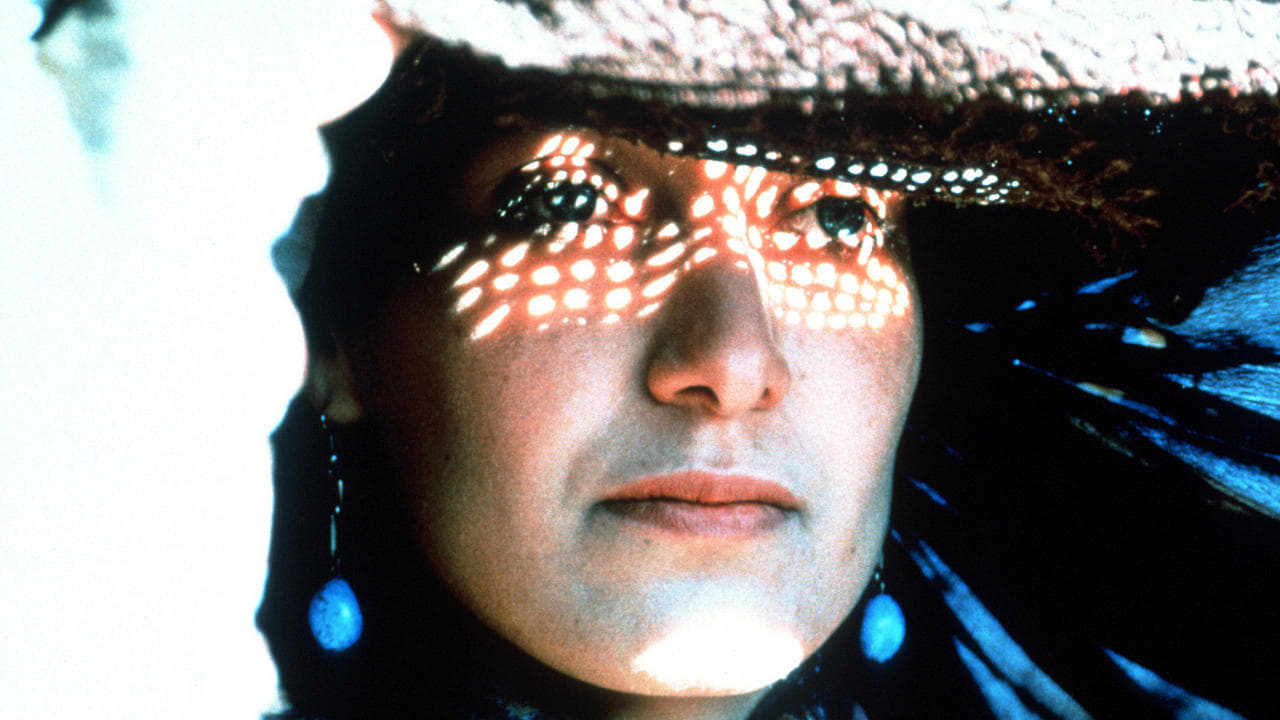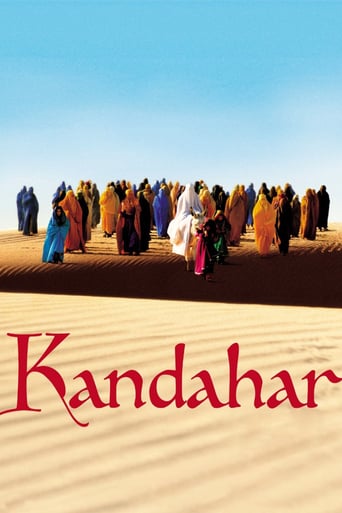

Pretty Good
... View MoreCharming and brutal
... View MoreFun premise, good actors, bad writing. This film seemed to have potential at the beginning but it quickly devolves into a trite action film. Ultimately it's very boring.
... View MoreIt really made me laugh, but for some moments I was tearing up because I could relate so much.
... View MoreThis is about the return to the place of childhood; a woman must return to Kandahar before the next eclipse when her sister plans to commit suicide. She is an ex-pat journalist so that we can have an intellectual view about the contrasts of life whispered into a tape recorder but all that is flat and uninteresting and the poetic soliloquies even more. Brush that aside. No, why this should be illuminating is because it swoops down in a strange corner of the world and finds intimacy and truth among the absurdity. Not for any contrasts the filmmaker can whisper to us but for those the place can whisper to his camera. This is what Chris Marker did again and again, who is the inspiration behind this; the eye reflected back. This too what Herzog did, who chases after absurdities because the landscape close to them tilts revelations.Absurdities abound along the way here; a makeshift hospital where amputees clamor to be fitted with crude artificial legs, the legs dropped from the sky. The rosy afterglow of flat desert is an evocative canvas, the veiled women chill like they always do with that sense of wasted beauty. But so little here feels stumbled on to, discovered, open; it feels stagy and contrived. A quick look at the background of the film reveals that it was shot, a little more safely perhaps, on this side of the Iranian border. The faces, the dresses, the landscape, all these are probably not much different than over there, but there's also no urgency anymore. I won't pretend to know better than the filmmaker of course but the whole film strikes me as more about culture than reflection, the kind of culture about faraway, oppressed places patrons love to consume at film festivals in Europe.Maybe it's his way of saying there are no more vital truths than the absurdity that people contrive to create that has a male doctor examining an Afghan female patient through a hole so as to not see her face. But there must be, there are.
... View MoreThe film Safar e Ghandehar was shown in the U.S. with the title Kandahar (2001). It was written and directed by the Iranian director Mohsen Makhmalbaf.Nelofer Pazira plays Nafas, a woman from Afghanistan who now lives in Canada. She travels to Iran, and then to Afghanistan, to help her sister. (Her sister is terribly depressed, and plans to commit suicide within a few days.) There's a very grim scene in Iran, when children returning to Afghanistan are taught to avoid picking up dolls, because they may be booby-trapped with explosives. Then Nafas crosses into Afghanistan with a group of returning refugees.The remainder of the movie--set in Afghanistan--makes the situation in Iran look idyllic. All the women wear the burqa (burka), so that we can't see them, and they have to see the world through a semi-transparent veil. Lawlessness abounds. Gunmen--I assume they are Taliban--roam the area and operate at will. Most horribly, people with amputated limbs are everywhere. There's a whole culture of amputations and artificial limbs, with more amputations from land mines every day.Nafas makes her way though this dangerous landscape in what is, in essence, a road movie. Although the people she meets are interesting--and sometimes generous and helpful--the situation is so depressing that it's hard to find any comfort while watching the film.This movie gives us a snapshot of what it would be like to be a woman--accustomed to living in North American--who has returned to a very different homeland from the one she left. The director is Iranian, so I don't know how authentically the scenes represent Afghanistan. My guess is that they are authentic, and that they portray a sad and horrible truth.We saw the film on DVD. I think it would work better in a theater. It's a great--if grim--movie, and it's worth seeking out and viewing.(Note that the director of Kandahar, Mohsen Makhmalbaf, is the director who is impersonated by the protagonist in the Kiarostami movie Close-Up.)
... View MoreA poster wrote "There is one remarkable scene wherein hordes of desperate, one-legged men hobble on crutches across the desert as Red Cross helicopters rain prosthetic limbs down onto the sands below". Well, the scene was total B***S***! The Red Cross has worked in Afghanistan for nearly 30 years and for probably half that time has had the world's largest orthopaedic programme. Each and every limb is made to fit for each person and then there are weeks of rehabilitation in one of the many well equipped orthopaedic centres around the country after the limb has been fitted. There is no need to buy and sell them on the black market because they are free of charge to anyone who needs one. Always have been and always will be. There is also no way on earth that the Red Cross ortho programme has ever been run out of tents in the desert and absolutely no way the Red Cross ever dropped double prosthetics out of helicopters or planes. The entire scene is an insult to the Red Cross. And before you howl me down I have been working in Afghanistan and have seen the work done by the Red Cross before, during and after the rule of the Taliban. The writer, producers and directors should be ashamed of themselves.
... View MoreThe film does have an almost documentary-like feel to it, that I think is because the main character is a journalist and she is presenting the world of Afghanistan to us. I found the film interesting, as another reviewer has put it, not in its politics but in its anthropology, it had the same fascination as watching a program on the Sky travel channel. The journalists mission, is very understated....the director held back from giving us a full on City of God oppression type of approach, but didn't, and I feel that was deliberately because he wanted us to experience the differences in culture between the Iranians and the Taliban governed Afghan side. He didn't quite pull it off for me, for two reasons....The first is I'm extremely cynical about watching any movie with a political bias, and this definitely has one. The second is, I don't think the central figure had enough charisma......Although thinking about it now, the two may have counterbalanced themselves quite well.... Anyway, it was interesting...so to was the documentary on the DVD, called Afghan alphabet. My concern about politics is illustrated nicely on that, when a young Afghan refugee, is used to show the oppression of the Taliban, because she is scared to remove her Bhurka for fear of sinning.....She is asked repeatedly what her name was, which she repeatedly said she didn't want to divulge and was clearly uncomfortable, and was in my opinion mentally bullied into removing her bhurka, which makes you wonder who is doing the oppressing now!!!
... View More